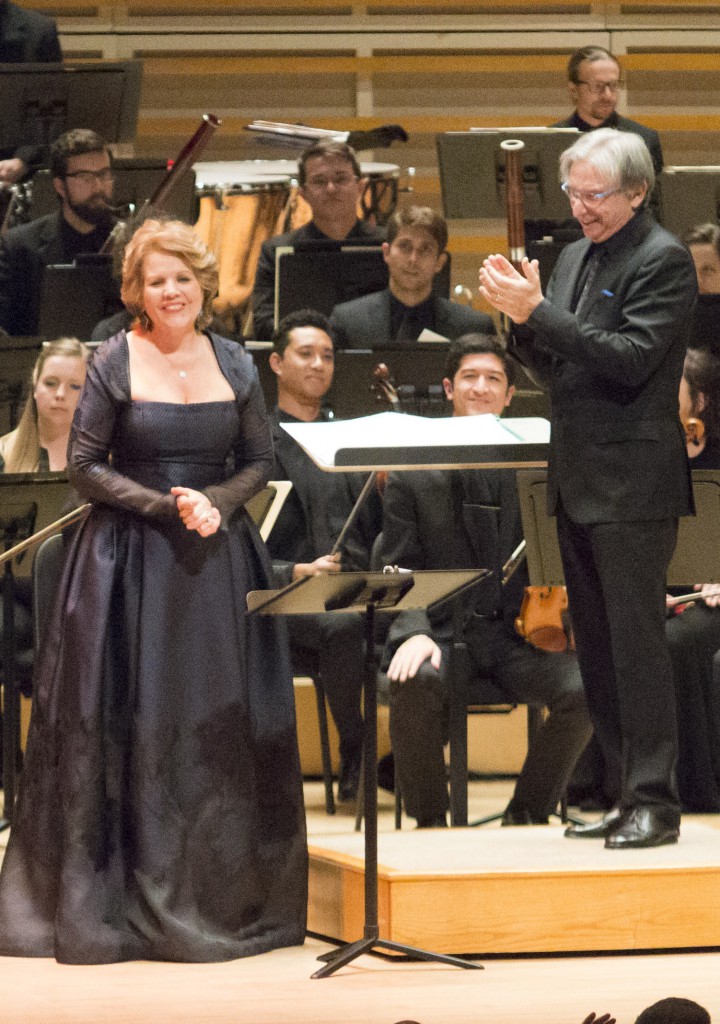Fleming joins MTT, New World for wide-ranging evening

Michael Tilson Thomas applauds Renée Fleming at the New World Symphony concert Saturday night at the Arsht Center. Photo: Altone Ponte
A celebrity soloist invariably joins the New World Symphony when the orchestra crosses Biscayne Bay to perform at Miami’s Arsht Center. For its first concert there this season, the star was the soprano Renée Fleming Saturday night for a program that ranged from an erotic French evocation of Asia through 20th century and American music.
Fleming, 57, has been reducing her performances on the opera stage, where her prized interpretations of Mozart, Strauss, Verdi and others have made her a star, in favor of concert appearances. If her voice has lost some of its richness, she retains a warm, focused sound and incomparable sense of style and phrasing.
She opened with Gershwin’s “Summertime,” from Porgy and Bess. Her singing was easy and informal, subtle and restrained, with a southern accent that never felt affected and that brought out the song’s humid allure.
Fleming sang selections from Poems of Emily Dickinson by New World co-founder and artistic director Michael Tilson Thomas, who conducted the performance, and wrote the song cycle for her. As you would expect from a man who has spent his life directing orchestras, the scoring is masterful, transparent as glass, giving color to Fleming’s singing while scrupulously allowing the words to come through clearly.
She brought subtle wit and lyricism to these works. At times, as in “The Bible is an Antique Volume,” the orchestra seemed to be making a sardonic commentary on Fleming’s soaring voice. Most effective was the song “The Earth Has Many Keys,” where Fleming’s brooding singing was illuminated by glassy, ghostly sounds in winds and strings.
When Renée Fleming comes to town, however, most people want to hear works that display her vocal powers at their best, the plush voice, sensitive phrasing and emotional commitment that made her an operatic star. This opportunity came in Ravel’s Shéhérazade, a setting of three poems by the French poet Tristan Klingsor. In words and music, these are a European’s fantasy of the mysterious East, with its princesses, assassins, silken robes and grand viziers.
Fleming sang with husky warmth in the lower register, where much of this erotically charged music lived, her seamless phrasing and sensitivity to every word making this the highlight of the evening. She luxuriated in the French words, bringing a sugared edge to her pronunciation that made the performance an almost tactile experience. Her singing took on a touch of violence as she sang the poet’s fantasy of a land of assassins and executioners. In the final song, about the allure of an androgynous stranger, she brought an aching sense of yearning, with long-held pianissimos that soared over the audience. The orchestra gave a fine account of the richly colored score.
The New World’s musicians, called fellows, are recent conservatory graduates who spend a few years at the Miami Beach-based ensemble as a sort of finishing school. Their ranks always include a conducting fellow, and this concert included a performance led by the new conducting fellow, Dean Whiteside.
He led a crackling rendition of the suite from Prokofiev’s opera The Love for Three Oranges. The opening was full of bold attacks, with a touch of humor. In a section involving a card game between a magician and a witch, the orchestra produced effectively murky, dark-hued wind and brass playing. The famous march built through a powerful crescendo, bringing maximum force and freshness to this familiar music. In the final section, strings played so fast the music seemed on the edge of going off the rails, but never did, giving the finale frantic energy and excitement.
The concert ended with Stravinsky’s Rite of Spring. Tilson Thomas, who had worked with Stravinsky as a young man in Los Angeles, led a performance that was full of brilliant episodes, with sure sense of drama in this modernistic evocation of pagan Russia.
The opening minutes had an almost deliberately chaotic feel, with the spring-like burbling in winds, brass and strings. Moments of pagan ritual arrived with ferocity and shock–as in the Spring Rounds, which gained intensity in repeated chords in violins topped by brass. Throughout, the orchestra gave a virtuoso performance, with electric intensity in the frenzied passages evoking ritualistic dance and stellar performances on solo instruments.
Part Two of the ballet was especially effective, in the scene leading up to the sacrifice of the girl forced to dance herself to death. The Ritual of the Ancestors passage, with its repeated figures in winds, ground forward with ominous power, as brass entered to create a sense of the inexorable force of the religious obligations that required such a sacrifice.
Posted in Performances
Leave a Comment
Sun Oct 23, 2016
at 1:52 pm
No Comments